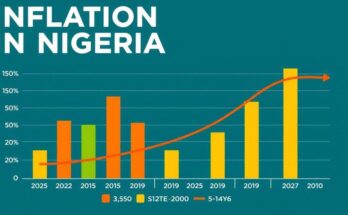Africa is rich in resources and potential yet struggles economically, losing billions daily due to unseized opportunities. Key sectors for growth include agribusiness, manufacturing, technology, logistics, renewable energy, and tourism. The article highlights the need for local entrepreneurs to lead transformation and outlines five essential strategies to seize these opportunities.
Africa is characterized by its vast untapped potential, abundant resources, and diverse opportunities. Despite these advantages, the continent faces challenges such as economic instability, high unemployment rates, and sluggish industrial growth. Billions of dollars are lost daily, not due to a lack of opportunities, but rather a failure to recognize and capitalize on them. Key areas ripe for investment include agribusiness, technology, logistics, and financial services, challenging us to prepare to seize these opportunities.
1. Agribusiness – The Sleeping Giant
Agriculture, the backbone of numerous African economies, sees considerable imports despite the agricultural potential. For instance, Ghana spends over $2 billion annually on rice imports, excluding similar expenditures for poultry and cooking oil. With significant investments in commercial farming and food processing, opportunities abound, such as maximizing the coconut industry, which is projected to reach $31 billion globally by 2026. Proper investment in modern techniques could spur growth in cashew processing, shea butter production, and cocoa value addition.
2. Manufacturing & Industrialization – Beyond Just Raw Materials
Africa’s economy remains reliant on exporting unprocessed raw materials. The necessity to shift this paradigm is paramount; countries like Ghana import vast amounts of finished goods while producing necessary materials, such as cotton. By investing in local textile manufacturing and promoting Ghana’s rich heritage in textile production, the nation could substantially reduce its dependency on imports and boost job creation.
3. Tech & Digital Economy – The Next Gold Rush
With 650 million mobile users, Africa is witnessing a fintech revolution. However, there is immense potential in developing tech solutions that cater to local demands. Innovations in mobile banking, e-commerce, and health tech, such as M-Pesa in Kenya, illustrate this potential. Ghana has made strides in mobile payment systems but should focus on developing African-owned digital marketplaces that align with local business needs.
4. Logistics & Transportation – The Missing Link
Trade inefficiencies stem largely from inadequate logistics, resulting in high transportation costs within Africa. By investing in logistics solutions, such as cold storage for perishables and cross-border e-commerce fulfillment centers, economic barriers can be lowered. For example, optimizing Ghana’s fragmented trucking industry through digital platforms can lead to cost reductions and increased profitability.
5. Renewable Energy – Powering the Future
Africa possesses abundant renewable energy resources yet struggles with electricity shortages. Investing in solar farms and mini-grid solutions could not only alleviate these shortages but also create substantial economic opportunities. Companies like PEG Africa demonstrate that profitable solar power systems can transform energy access for millions across the continent, tapping into a significant market demand.
6. Tourism & Hospitality – The Undervalued Goldmine
Ghana’s tourism sector reveals enormous potential, as shown by the $1.9 billion revenue from the Year of Return campaign in 2019. Many tourism assets remain underdeveloped or poorly marketed, especially eco-tourism opportunities. Investing in luxury resorts and authentic cultural experiences can help harness the interest in African heritage and nature, similar to the successful safari tourism models in other countries.
To seize these opportunities, a multifaceted approach is necessary:
1. Mindset Shift: Local stakeholders must embrace ownership of transformation rather than awaiting foreign lead.
2. Access to Capital: Funding must target growth sectors such as agribusiness and technology startups.
3. Infrastructure Development: Investments in transportation and energy infrastructure are crucial for scalability.
4. Government Policies & Support: Support local producers with tax incentives and reduce reliance on imports.
5. Collaboration & Innovation: Businesses should leverage innovative technologies and partnerships to fuel growth.
In conclusion, Africa, particularly Ghana, possesses numerous billion-dollar opportunities waiting to be harnessed through decisive action. Whether in agribusiness, technology, manufacturing, logistics, or renewable energy, the time for bold execution is now. The industries of the future are available to those ready to seize them. Will you be one of the pioneers?
In summary, Africa possesses vast and varied billion-dollar opportunities waiting to be explored, particularly in sectors such as agribusiness, technology, manufacturing, logistics, and renewable energy. However, these opportunities remain largely untapped due to economic instability and a lack of proactive strategies. By fostering a favorable environment for investment, developing infrastructure, and promoting local entrepreneurship, the continent can thrive economically. The call to action is clear: it is imperative that local stakeholders rise to the challenge of harnessing this potential.
Original Source: www.gbcghanaonline.com




